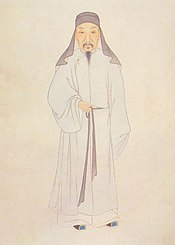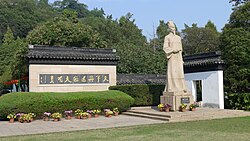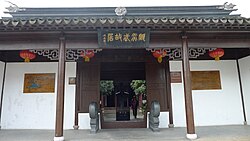| Gu Yanwu | |||||||||||||||||||||||
|---|---|---|---|---|---|---|---|---|---|---|---|---|---|---|---|---|---|---|---|---|---|---|---|
 | |||||||||||||||||||||||
| Born | Gu Jiang 顧绛 (1613-07-15)15 July 1613 | ||||||||||||||||||||||
| Died | 15 February 1682(1682-02-15) (aged 68) | ||||||||||||||||||||||
| Other names | Gu Zhongqing 顧忠清 Gu Ningren 顧寧人 Lord Tinglin 亭林先生 | ||||||||||||||||||||||
| Occupation | Student of the Guozijian (1643) | ||||||||||||||||||||||
| Known for | One of the Five Great Qing scholars (Huang Zongxi, Fang Yizhi, Wang Fuzhi, Zhu Zhiyu) | ||||||||||||||||||||||
| Spouse | Lady Zhu | ||||||||||||||||||||||
| Parents |
| ||||||||||||||||||||||
| Relatives | Great grandfather: Gu Zhangzhi Nephew: Xu Qianxue, Xu Bingyi, Xu Yuanwen | ||||||||||||||||||||||
| Chinese name | |||||||||||||||||||||||
| Traditional Chinese | 顧炎武 | ||||||||||||||||||||||
| Simplified Chinese | 顾炎武 | ||||||||||||||||||||||
| |||||||||||||||||||||||
Gu Yanwu (Chinese: 顧炎武) (July 15, 1613 – February 15, 1682), also known as Gu Tinglin (Chinese: 顧亭林), was a Chinese philologist, geographer, and famous scholar in the early Qing dynasty. After the Manchu conquest of north China in 1644, Gu participated in anti-Manchu activities. He never served the Qing dynasty. Instead, he traveled throughout north China, engaging in local studies intended to strengthen China's intellectual and spiritual resources.
Biography

_______
Gu, a native of Jiangsu, was born as Gu Jiang (simplified Chinese: 顾绛; traditional Chinese: 顧絳; pinyin: Gù Jiàng). Gu began his schooling at the age of 7. In the early spring of 1645, Gu was appointed to be Office Manager in the Ministry of War 兵部司務 at the Southern Ming court in Nanjing. There he proposed strategies for strengthening resistance to the Qing. Disillusioned by the Southern Ming's ineffectiveness, Gu resigned and returned to his hometown. In 1655, Gu and friends killed a disloyal family servant who had revealed to Qing officials Gu's service at the Southern Ming court. Gu was arrested and charged by corrupt local officials, but a friend caused the case to be removed to another jurisdiction, from which he was released. In the next year, Gu was the target of an assassination attempt instigated by a predatory neighbor formerly allied with the deceased disloyal servant. Gu then left home and traveled in north China for nearly all his remaining years.
Inspired by Chen Di, who had demonstrated that Old Chinese has its own phonological system, Gu studied rhyming words in ancient classics and grouped them in 10 rhyme categories, which served as a founding model for Qing period evidential research on the classical legacy. Gu's positivist approach to a variety of disciplines, and his criticism of Neo-Confucianism had a huge influence on later scholars. His works include "Five Studies on Phonology" Yinxue Wushu (音學五書), "Digest of Daily Learning" Ri Zhi Lu (日知錄) and "Compendium of Historical Geography" Zhao Yu Zhi (肇域志).
In 1682, while returning from a friend's home to Huaying, Gu fell from horseback and died the next day.
Together with Wang Fuzhi and Huang Zongxi, Gu is regarded as one of the most outstanding Confucian scholars of the late Ming and early Qing Dynasties.
Aphorism
"Everybody is responsible for the fate of the world" (Chinese: 天下興亡,匹夫有責; pinyin: tiān xià xīng wáng, pǐ fū yǒu zé)
Alternatively, The rise and fall of the nation concerns everyone; or Everyone bears responsibility for the prosperity of society.
Legacy
Gu is commemorated by Tinglin Park and the Gu Yanwu Museum in Tinglin Park of Kunshan. In 2005, the Central Propaganda Department of China named the Gu Yanwu Museum located at Gu's former residence in Qiandeng town as a "national patriotism education base".
Former residence of Gu Yanwu
The former residence of Gu Yanwu is located in Qiandeng town of Kunshan, a Ming dynasty complex with main hall, living quarter, a study and a garden. Gu Yanwu's grave is located in a quiet corner of the garden.


See also
References
- 顾炎武:天下兴亡,匹夫有责_网易新闻中心 [Gu Yanwu: the rise and fall of every man's duty]. 163 (in Chinese). 2006-12-29. Retrieved 2011-10-10.
- 顾炎武 [Gu Yanwu]. Guoxue (in Chinese). Beijing Culture Communication Company . Retrieved 2011-10-10.
- 历史悠久的亭林公园 [Historic Tinglin Park]. News Kunshan (in Chinese). China Telecom. 2010-10-10. Archived from the original on 2012-04-25. Retrieved 2011-10-26.
- "江苏省爱国主义教育示范基地" [Patriotism education bases in Jiangsu Province]. Xinhuanet. Xinhua. 2004-10-14. Archived from the original on October 22, 2014.
- 何九盈 (1995). 中囯古代语言学史 [A history of ancient Chinese linguistics] (in Chinese). Guangzhou: Guangdong jiaoyu chubanshe.
Further reading
- Peterson, Willard J. (1968). "The Life of Ku Yen-wu (1613-1682)". Harvard Journal of Asiatic Studies. 28: 114–156. doi:10.2307/2718597. ISSN 0073-0548. JSTOR 2718597.
- Peterson, Willard J. (1969). "The Life of Ku Yen-wu (1613-1682)". Harvard Journal of Asiatic Studies. 29: 201–247. doi:10.2307/2718835. ISSN 0073-0548. JSTOR 2718835.
- Johnston, Ian (2015-01-31). "Gu Yanwu: Translations of Letters, Poems and Essays". Cordite Poetry Review. Retrieved 2017-03-31.
- Ng, On Cho; Wang, Q. Edward (2005). Mirroring the Past: The Writing and Use of History in Imperial China. Honolulu: University of Hawaii Press. pp. 229–231. ISBN 978-0-8248-2913-1
- Hummel, Arthur W. Sr., ed. (1943). "Ku Yen-wu" . Eminent Chinese of the Ch'ing Period. United States Government Printing Office.
External links
| Ming dynasty scholars | |
|---|---|
- 1613 births
- 1682 deaths
- 17th-century geographers
- 17th-century Chinese scientists
- Chinese geographers
- Linguists from China
- Chinese Confucianists
- Ming dynasty philosophers
- Ming dynasty scholars
- Philosophers from Jiangsu
- Qing dynasty philosophers
- 17th-century Chinese philosophers
- Scientists from Suzhou
- Writers from Suzhou
- Qing dynasty writers
- People from Kunshan